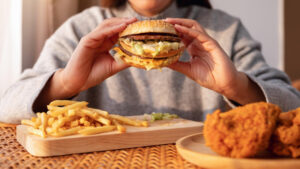Living with Irritable Bowel Syndrome (IBS) can be quite a challenge. It’s all about juggling your meals, managing stress, and sticking to a routine while trying to dodge those unexpected flare-ups. Since IBS symptoms can differ from person to person, there are some common triggers that many people experience. By pinpointing and steering clear of these triggers, you can boost your comfort and overall quality of life.
Whether you’re just starting to navigate your IBS journey or you’ve been dealing with it for years, here are five key triggers to keep on your radar.
1. High FODMAP Foods
FODMAPs (Fermentable Oligosaccharides, Disaccharides, Monosaccharides, and Polyols) are types of carbohydrates that don’t get absorbed well in the small intestine. Some common high-FODMAP foods include onions, garlic, beans, apples, milk, and wheat. These can lead to bloating, gas, and diarrhoea for those with IBS.
2. Caffeine and Fizzy Drinks
That morning coffee or afternoon soda might be hard to resist, but caffeine is a known stimulant that can aggravate IBS symptoms by ramping up gut activity. Fizzy drinks can also lead to excess gas and bloating.
Why not switch to caffeine-free herbal teas or refreshing water infused with fruits like lemon or cucumber? They’re much gentler on your gut!
3. Stress and Anxiety
The connection between your gut and brain is strong, often referred to as the gut-brain axis. Emotional stress can ramp up IBS symptoms, making stress management an essential part of your treatment plan.
Try to weave in some relaxation techniques like deep breathing, meditation, or yoga into your daily routine. Even just 10 minutes a day can help keep your digestive system feeling more at ease.
4. Fatty and Fried Foods
Greasy, high-fat meals can set off IBS symptoms for many people, often resulting in cramps or diarrhoea. Local favourites like char kway teow or those tempting deep-fried snacks might need to be saved for special occasions instead of being part of your daily diet.
5. Artificial Sweeteners
Some sugar substitutes, especially sorbitol, mannitol, and xylitol (which you’ll often find in sugar-free gum or diet drinks), aren’t absorbed well by the body and can cause bloating and diarrhoea.
Be sure to read food labels closely and consider using natural sweeteners like honey (just in moderation) or go for unsweetened options whenever you can.
Manage IBS With Greater Confidence
Getting to know and avoiding your specific IBS triggers is crucial for living more comfortably. While there’s no standard solution for everyone, effective IBS management typically involves a mix of dietary adjustments, stress relief, and a professional advice.
At GastroClinic, we provide personalised support and advanced diagnostic tools to help you take charge of your IBS. Schedule a consultation today and start your journey to feeling better, one step at a time.













